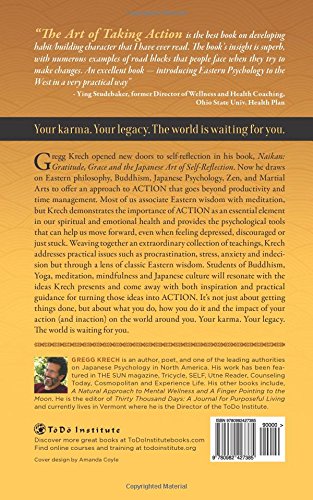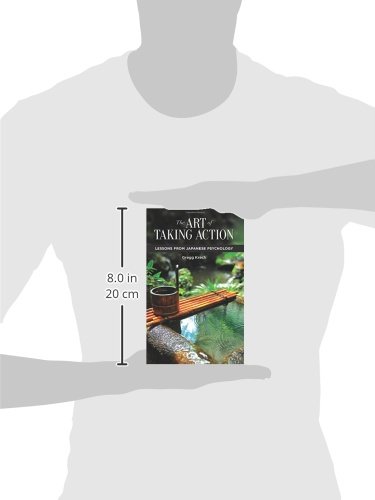Customer Services




Full description not available
J**R
It's All About Doing
If you are looking for some sound – and sometimes pretty direct – advice on how to get more done, this book offers plenty.We often do things that we think are preparing us to move forward when in fact they are things that help us avoid taking action. “Talking about what you need to do, researching your options, making a plan – these can all be effective strategies for avoiding what needs doing.”Gregg Krech, author of The Art of Taking Action, explores a number of different approaches that will help us defeat our tendency to procrastinate. Mr. Krech comes from a meditative background – his approach is largely based on the Morita Therapy approach – “When we stop trying to escape from things as they are, we can move forward and live in a more natural and meaningful way.” Acceptance is the first step.When we experience discomfort, we often default to: avoidance, resignation or complaining, none of those strategies actually help us move forward. By accepting our thoughts and feelings we can move forward and accomplish our goals in life.Mr. Krech writes in a conversational, easy to understand style. He often uses real world examples to illustrate his points. There are several essays by guest authors included in the book. Each chapter is generally introduced by a quote from an Eastern philosopher.One of the key chapters of the book deals with Inaction – Deciding is Not Doing. Too often we decide on a course of action and then relax. “But we should not confuse deciding with acting.” Until we take constructive action, we have not changed reality.“Don’t prepare. Begin” should be a mantra we all keep in front of us. “Start before you are ready.” Is another great idea to keep us taking action, moving forward.There are some good but rather simple points that if acted on will help anyone become better at taking action. Ideas do not count – only action.If you can develop “the capacity to make decisions based on purpose rather than feeling” you will be well on your way to mastering the art of taking action.If is easy to convince yourself that reading the book will improve your ability to take action. Taking action is what will improve your ability to take action. So read the book and learn the tips and techniques – then apply them.
K**R
Good book
Good tips. Even if it's not perfect. It makes for a good starting off point. You'll some golden nuggets for sure.
O**U
A Valuable Start Towards Taking Compassionate Action
This is another wonderful exercise in sharing the Naikan and Morita experience that is offered by Gregg Krech. I am a psychiatrist who is trained in the Western allopathic methods of care. I find that often times, the Western method neglects the personal stories of patients.The psychological histories that we gather are often focused on pathology. Not only the patient's pathology but the family pathology as well. There is in my opinion, a skewed approach that is based on illness and deficiency.That skewed approach depends to a great degree upon identifying who is at fault in relationships and who was the victim in the relationships with others. Naikan approaches allow for a more truthful and honest telling of the story that brings balance to the experience. Another aspect of traditional Western healing methods is the sense that one cannot move forwards until "what was wrong", is made right. This can take time and does not allow for moving forward when the "other" in the dyad of the relationship is not willing to meet the patient "halfway". Morita approaches facilitate the patient or individual's moving forward towards healing. Often times, the major impediment is waiting until feelings about the relationship change before taking the necessary actions for change. Regardless of the feelings,most individuals want the relationship status to become different and Morita approaches allows actions to take place while feelings change.I utilize these approaches in my practice and find that meaningful insights and productive change often occurs within a relatively short period of time if the patient commits to the interventions offered. Of course,everyone does not engage in the practices of Naikan and Morita therapy. Many individuals do not, for whatever reason, proceed beyond the pre-contemplation stage of readiness for change. Some people find that for cultural reasons that these Eastern approaches would not work for them. Sometimes individuals are in a "New Age" frame of mind and are shopping for a quick fix which is not the goal of either of these methods. These Eastern approaches require long term commitment and sustained effort that do not depend on the skill of the therapist or provider.Rather these quiet therapies depend on the individual's honest and courageous approach of inward looking as well as taking action when one "does not feel like it." Everyone who is exposed to these quiet therapies will not necessarily find them useful but in my experience,many do.In closing, Gregg Krech presented what is a nice introduction to how the Naikan and Morita approaches can be utilized to begin physical,mental and spiritual well being. Further study and experience is necessary for a full effect. No one should expect a comprehensive explanation of these deep practices in a book of any length, but this book is a very good place to start.
R**S
The most important concept for improving your life...
This book warrants my first review after years of reading books on Amazon. I've read many self-improvement books, and this book has made the most tremendous impact on me. Its primary concept is so simple yet so powerful: do what needs to be done regardless of how you feel - take action according to the needs of a situation, not according to the needs of your emotional state. Simply put, focus on doing rather than feeling. When you do this consistently, not only will your productivity increase but your mental health will substantially improve. DO consistently and DO gently - it's not about forcing yourself to do things or psyching yourself up to JUST DO IT! and intensifying your life. It's about consistently doing what you know needs to be done without thinking about it. There's a ubiquitous misconception in our comfortable & stimulating modern society that we should feel fully motivated to do something and feel good while doing it. Once you realize that is not true - you do not need to feel motivated to take action and you do not need to feel good while getting something done - then you will be on your way to significantly improving every facet of your life. And over time you will feel so much better in general. It's not hard. It just takes practice and consistency. I'm truly grateful for this book's many great ideas to help implement the wonderful concept of taking action. Very highly recommended.
Trustpilot
1 day ago
1 month ago